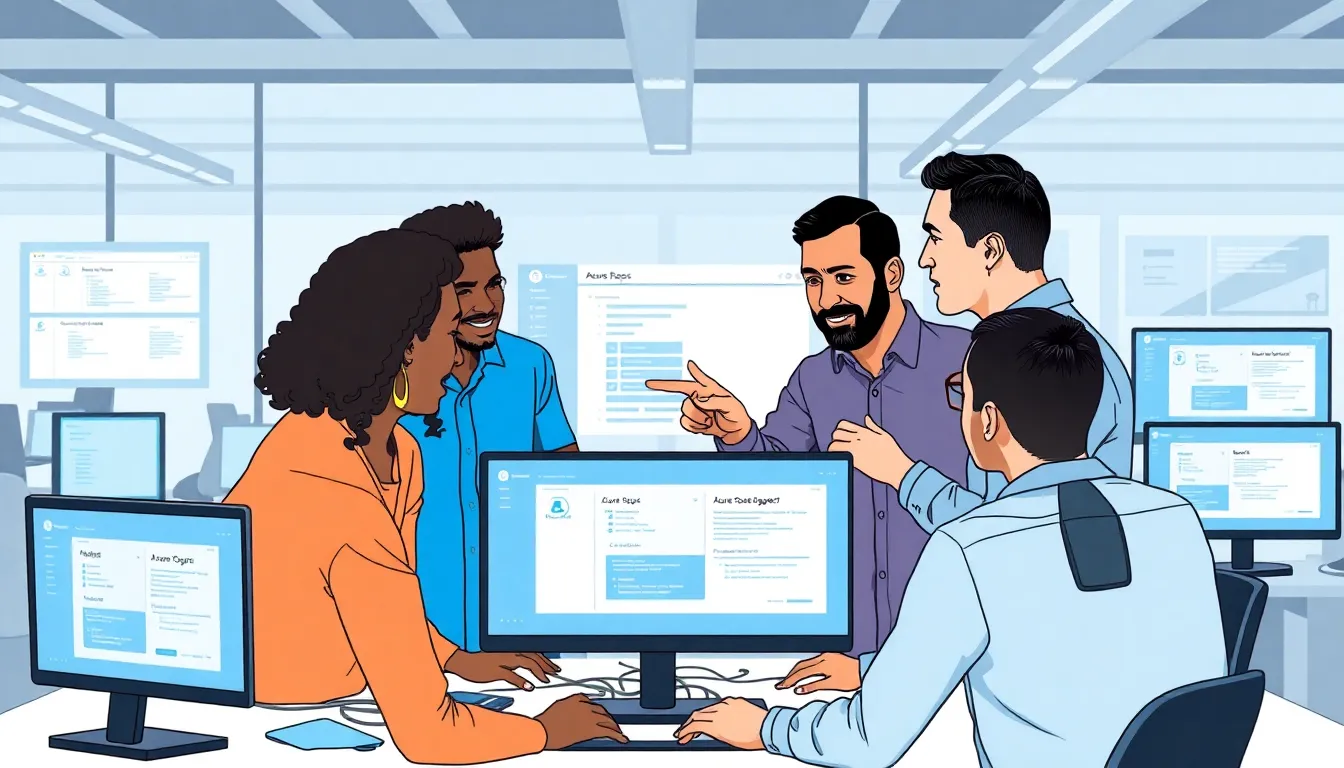Table of Contents
ToggleIn the fast-paced world of tech, the Azure DevOps Engineer is like a superhero, swooping in to save projects from chaos and confusion. Armed with the power of Microsoft Azure, they streamline development processes and ensure teams work like a well-oiled machine. If you’ve ever wondered how software gets delivered faster than a pizza on a Friday night, look no further than these unsung heroes.
Overview of Azure DevOps Engineer
Azure DevOps Engineers play a vital role in modern software development. Expertise in Microsoft Azure enables them to streamline processes and enhance collaboration among teams. Responsibilities include managing project methodologies, integrating DevOps practices, and automating workflows.
Collaboration tools such as Azure Boards and Azure Repos are essential for tracking tasks and managing code repositories. Familiarity with CI/CD (Continuous Integration/Continuous Delivery) pipelines allows these engineers to ensure swift and reliable software deployment. Their skills in scripting and automation empower teams to produce high-quality software efficiently.
Problem-solving is crucial in this role, as Azure DevOps Engineers often troubleshoot and resolve integration issues. They also evaluate tools and methodologies that improve project efficiency, using metrics to gauge performance. Building a culture of continuous improvement forms a key aspect of their responsibilities, fostering innovation and adaptability within teams.
A deep understanding of cloud environments, particularly Azure, serves as an advantage for these engineers. With an eye on security and compliance, they implement best practices to protect project integrity. Engaging with stakeholders ensures that projects align with business objectives while meeting technical requirements.
Furthermore, Azure DevOps Engineers remain current with industry trends, ensuring their knowledge stays relevant. By actively participating in professional communities, they share insights and best practices that contribute to team growth and project success.
Key Responsibilities


Azure DevOps Engineers play a critical role in modern software development. Their responsibilities encompass various aspects of project management and team collaboration.
Managing Development Lifecycles
Managing development lifecycles involves overseeing different stages of software development. Azure DevOps Engineers coordinate planning, execution, and delivery phases. They utilize Agile methodologies to ensure projects align with timelines. Tools like Azure Boards help track progress, maintain project transparency, and prioritize tasks effectively. Continuous monitoring of project statuses leads to timely adjustments, improving overall workflow. Implementing best practices for version control guarantees smoother transitions between development stages. Azure DevOps Engineers aim for consistent delivery of high-quality software by evaluating and adapting processes regularly.
Collaborating with Development Teams
Collaboration with development teams stands as a vital responsibility. Azure DevOps Engineers foster a culture of open communication, encouraging team members to share insights. Regular stand-up meetings enable quick updates on progress and any roadblocks faced during development. Full engagement with teams promotes a sense of ownership, resulting in increased productivity. Leveraging Azure Repos for code management enhances collaboration, allowing multiple developers to work concurrently without conflict. Establishing clear roles and responsibilities helps streamline efforts, ensuring that everyone is aligned with project goals.
Implementing CI/CD Pipelines
Implementing CI/CD pipelines significantly improves deployment efficiency. Azure DevOps Engineers set up automated testing and deployment processes to reduce manual errors. By utilizing tools like Azure DevOps Services, they facilitate continuous integration and continuous delivery. Monitoring these pipelines allows for early detection of issues that could impact software quality. Employing containerization technologies for application deployment enhances scalability and reliability. They also document processes meticulously to ensure team members can replicate or modify configurations as needed, fostering team resilience and knowledge sharing.
Required Skills and Qualifications
Azure DevOps Engineers require a blend of technical and soft skills to navigate the complexities of modern software development successfully. Mastery in specific areas empowers them to enhance productivity and collaboration within teams.
Technical Skills
Expertise in cloud platforms, particularly Microsoft Azure, remains essential. Knowledge of scripting languages such as Python and PowerShell facilitates automation. Familiarity with CI/CD tools and practices supports efficient software delivery. Understanding of containerization technologies like Docker improves deployment processes. Proficiency in version control systems, primarily Azure Repos, enhances collaboration on codebases. Familiarity with infrastructure as code (IaC) tools, such as Terraform, aids in managing cloud resources effectively. Practical skills in monitoring tools empower them to quickly identify issues and optimize performance.
Soft Skills
Communication serves as a cornerstone in team collaboration. They must demonstrate adaptability when facing project changes. Problem-solving capabilities enable them to address integration challenges effectively. Strong leadership fosters a culture of continuous improvement among team members. Active listening enhances understanding of stakeholder needs and expectations. Furthermore, conflict resolution skills can help maintain team harmony and ensure project alignment. Collaboration skills encourage open dialogue, driving innovation and efficiency within project timelines.
Career Path and Opportunities
Azure DevOps Engineers face an evolving job landscape that reflects the growing demand for rapid software delivery and efficient projects. Companies increasingly seek skilled professionals who can integrate development and operations for enhanced productivity.
Job Market Trends
The job market for Azure DevOps Engineers shows robust growth. According to LinkedIn, job positions in DevOps have grown by 30% year-over-year. Organizations recognize the need for these experts to streamline processes and accelerate development timelines. With more companies adopting cloud platforms, Azure skills remain highly sought after. Candidates with certifications, such as Microsoft Certified: Azure DevOps Engineer Expert, stand out in the competitive landscape. Professionals who enhance their skills continuously can leverage emerging technologies, ensuring they remain marketable as trends shift.
Advancement Opportunities
Advancement opportunities for Azure DevOps Engineers are plentiful. Many professionals transition into senior-level roles, such as DevOps Architects or Cloud Solutions Architects. These positions involve broader responsibilities, including strategy development and team leadership. Additionally, Azure DevOps Engineers can specialize in areas like security, automation, or containerization, further enhancing their career trajectory. Companies often support employee growth through training programs and certifications, motivating staff to pursue leadership roles. Networking within the tech community can also open doors to new opportunities, fostering professional relationships that promote career advancement.








